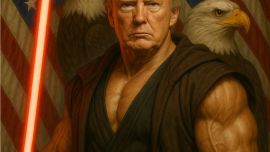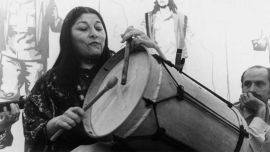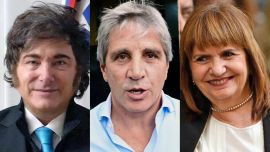Alberto Fernández is offically Argentina’s new president. The opposition candidate ousted pro-market incumbent Mauricio Macri last Sunday, tilting the nation back toward Peronism.
The 60-year-old former Cabinet chief – leading a pan-Peronist coalition spans the entire political spectrum, from conservatives to left-wing populists – quickly made it unclear exactly what kind of policy framework to expect as the country is submerged in a crippling recession.
“Hopefully those who were our opponents are conscious of what they’re leaving behind and help us rebuild the country from the ashes,” he told jubilant supporters on Sunday night, thanking them for backing “an egalitarian Argentina[...]” that values “workers” and “teachers.”
“We’re back and we’re going to be better,” he shouted over the raucous crowd at the Frente de Todos bunker in Chacarita.
The president-elect won 48 percent of the vote to Macri’s 40 percent, avoiding a run-off.
Though Macri’s 16-point loss in August’s PASO primaries pointed to this defeat, the president tightened the margin with his rival with a frenzied push during the race’s final weeks. Macri’s Juntos por el Cambio (“Together for Change”) coalition ended up surprising analysts with a strong electoral performance that will give it legislative weight in the future balance of power.
LIGHT ON POLICY SPECIFICS
Fernández’s campaign was light on policy specifics and his broad promises to improve things will run into immediate difficulty when he is sworn in, given a fiscal deficit and a dwindling of foreign reserves: The economy is contracting, inflation is above 50 percent, unemployment is more than 10 percent and a third of the population lives below the poverty line.
“Knowing what we promisedwe’re going to do everything in our power for the factories, the shades of all the factories to rise up once again,” he said Sunday night. “For those businesses, and every one of their workers to once again have jobs. So that public education is not a disgrace, so that the universities in the interior of the country are dignified. So that our scientists don’t have to migrate and leave our country because our country mistreated them.”
MOUNTING CONCERNS
Fernández must reckon with last year’s record US$57-billion bailout from the International Monetary Fund (IMF), which received a hostile reception from many of his supporters.
The rotund Peronist veteran must balance the expectations of his support base, which includes social movements that depend on government handouts, and the need to balance the budget.
International Monetary Fund (IMF) chief Kristalina Georgieva congratulated Fernandez, saying she “looks forward to engaging with his administration to tackle Argentina’s economic challenges and promote inclusive and sustainable growth[...]”
Cues from the United States indicated its apprehension of possibly losing a solid South American ally amidst a heating up of regional conflicts that have Bolivarian socialism at its centre, with Venezuela in the midst of a political, economic, and migratory crisis.
At the same time, the influence of Cuba in the region, and foreign nations including Russia and China, could grow with left-leaning leaders such as Fernández’s vicepresident-elect, former president Cristina Fernández de Kirchner. Treasury Secretary Steven Mnuchin told the incoming government this week they expect Argentina to uphold the IMF loan package commitments.
Meanwhile, President Donald Trump, who considered Macri an ally, didn’t call to congratulate his Argentine counterpart until Friday evening. “I’ve directed my IMF team to work with you,” he said.
Nearly all of the Latin American leaders have offered their congratulations, a key exception being Brazilian President Jair Bolsonaro, who threatened to impose Mercosur sanctions should Fernández win. After saying “Argentina chose wrong,” he announced yesterday he’d skip the inauguration next month.
THE CRISTINA QUESTION
A key issue moving forward will be Fernández’s interaction with his controversial runningmate, Cristina Fernández de Kirchner. She handed Macri an economy in 2015 on the verge of implosion due to years of populist policies including mass subsidies, capital controls, rising inflation, dwindling reserves, ignored creditors and fabricated economic data. Investors fear a dramatic shift back toward capital controls and protectionism, coupled with nationalistic rhetoric.
On election night, she slid into her previous role as fiery orator with ease: “I am going to ask in my character as ex-president [...] to take all the measures that should be taken to alleviate the dramatic situation in which the country’s finances are living,” she added.
At the start of the week, Fernández de Kirchner faced more than 10 corruption cases. Two charges have since been dropped and one was confirmed. She denies wrongdoing in all of them.
‘POSITIVE’ AND ‘SATISFIED’
In the days after the election, Fernández and Macri appeared amicable and committed to a smooth transition of power. The Frente de Todos leader said the two share the common goal of ending “Argentina’s suffering once and for all.”
The two men met Monday morning at the Casa Rosada. They discussed the dollar — especially relevant after the Central Bank announced the “super cepo” which restricts dollar purchases to US$200 per month and sets US$50 limit on cash advances on cards abroad — and how to effectively shepherd a smooth handover.
Fernández described it as “positive,” while Macri said “everyone was satisfied,” posing for handshake photos in the presidential office.
Later in the week, Macri asked his Cabinet to offer Fernández’s team “maximum collaboration” ahead of the change of government on December 10.
The president has won significant plaudits for his behaviour since the election result became known. That began on Sunday night, as he faced supporters onstage, and thanked them for their support.
“Thanks to the work we’ve accomplished these past years, the
country is in a better place.”related news


















Comments